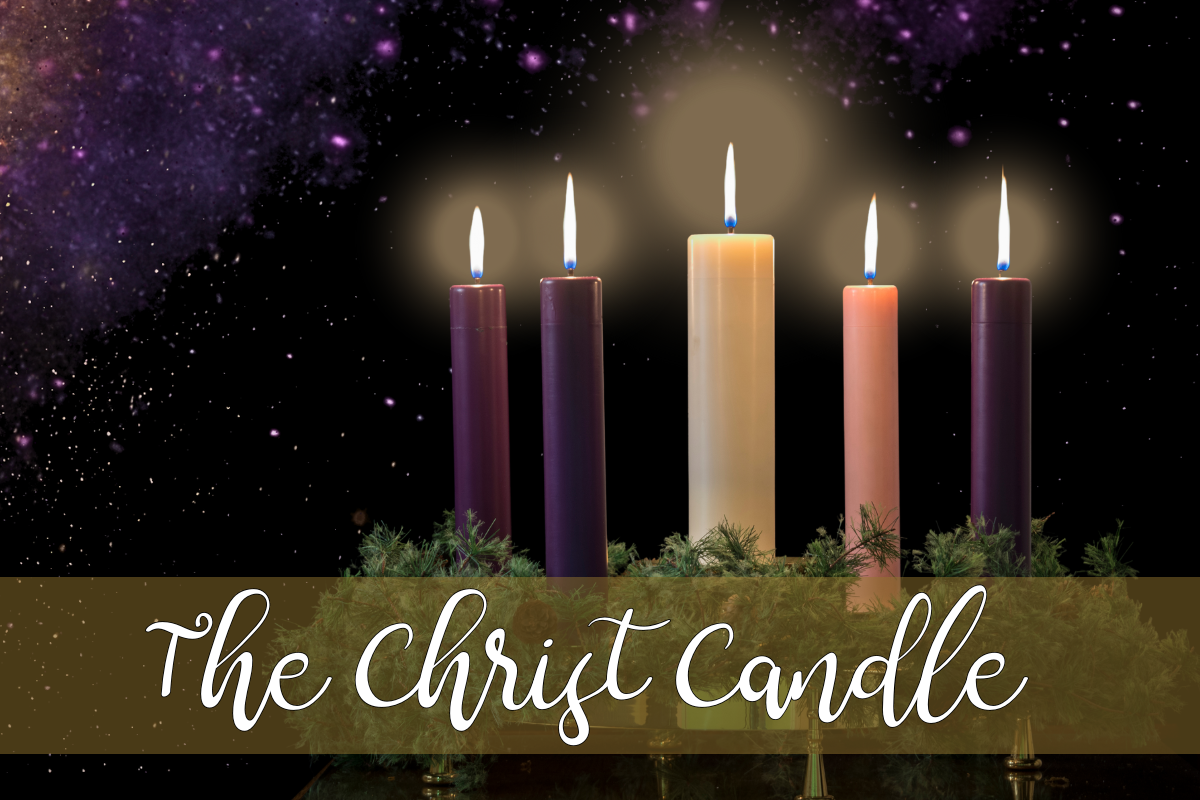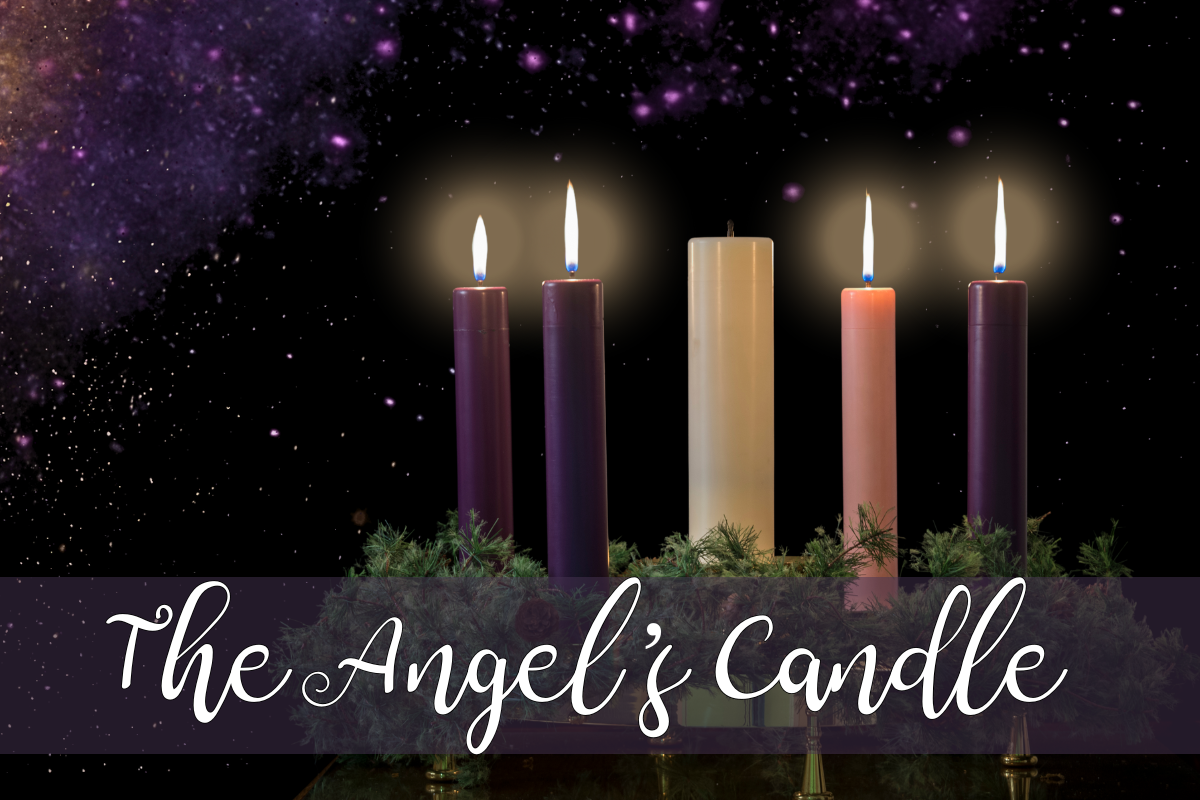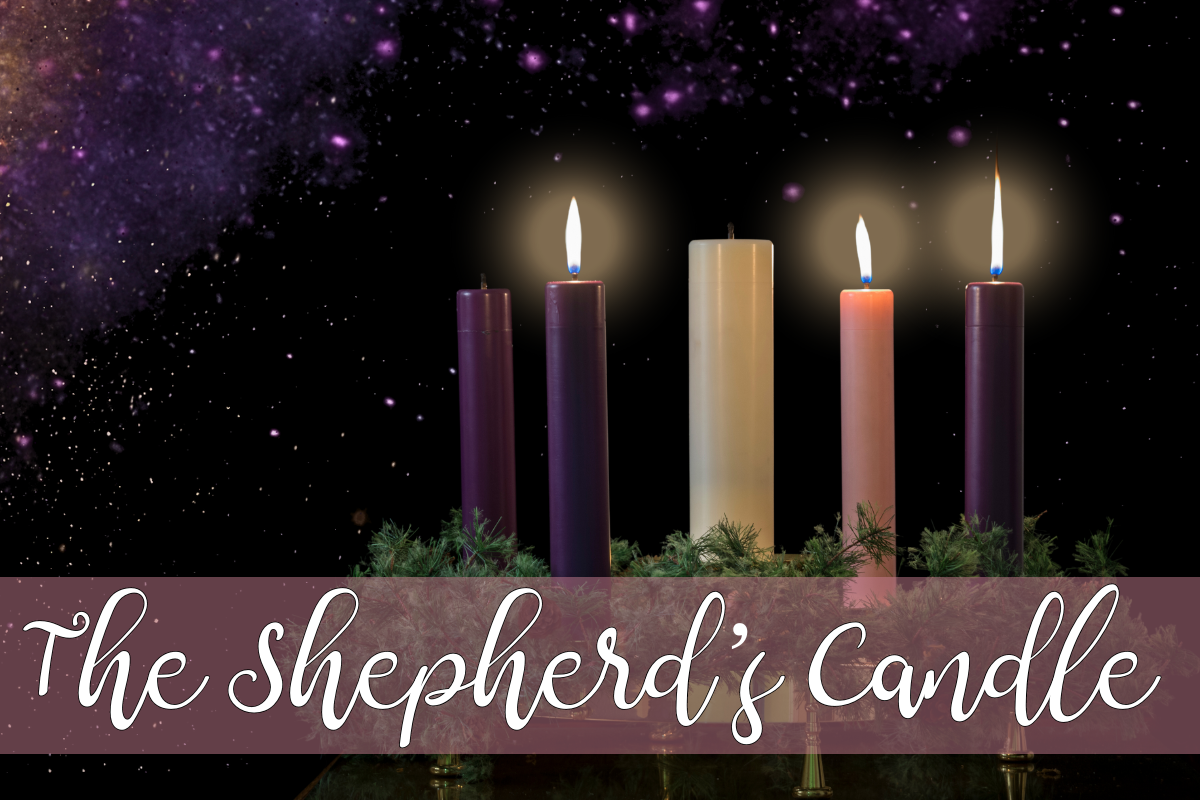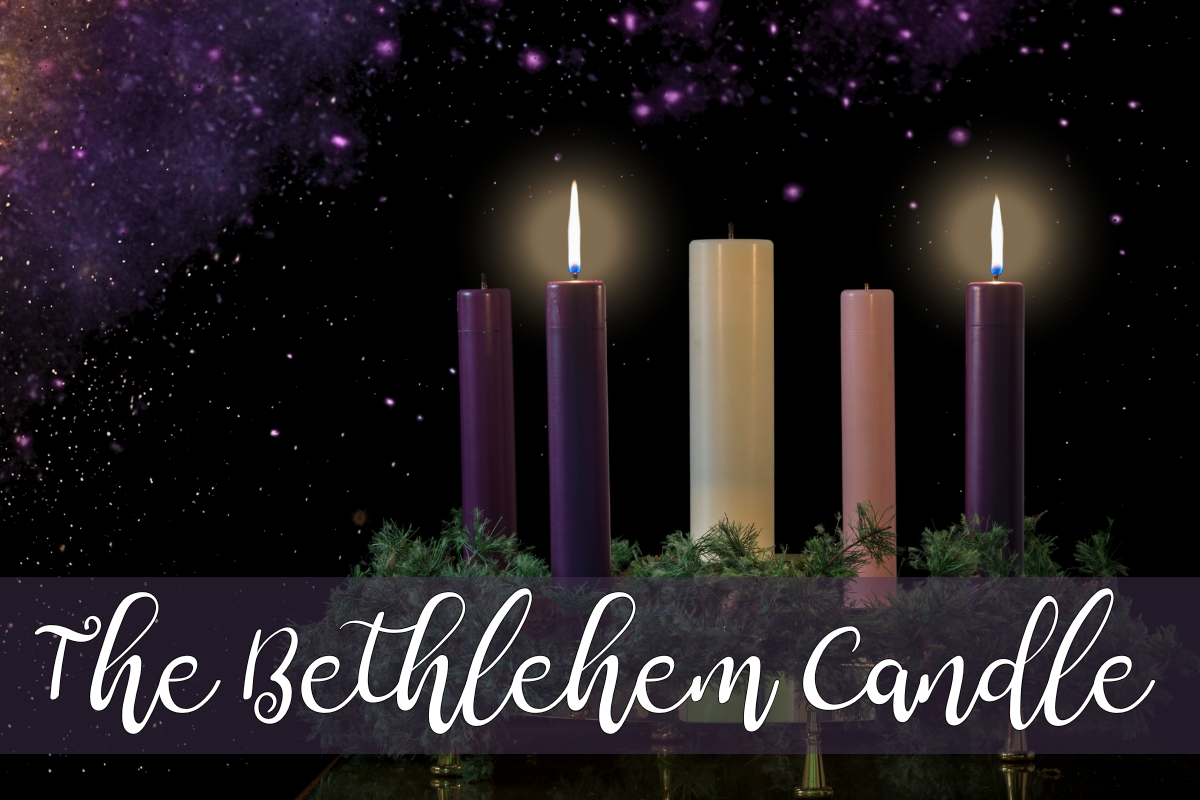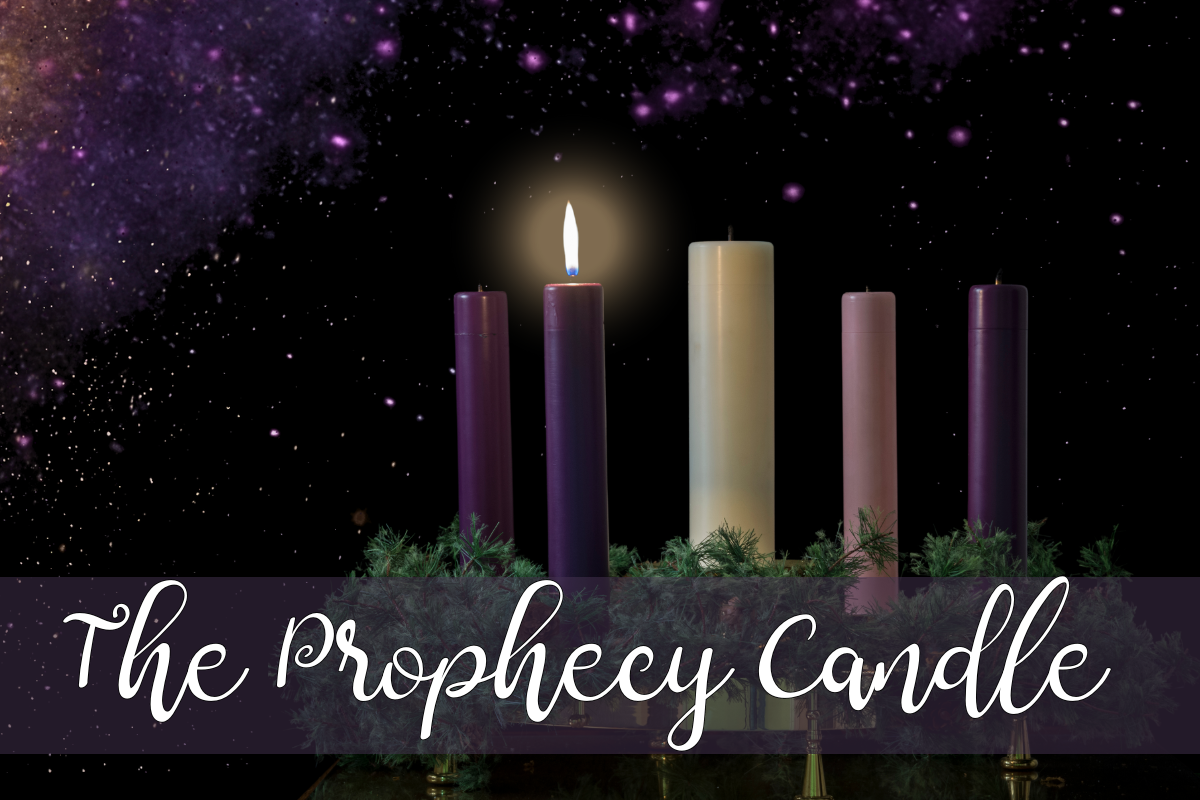Week Beginning December 31, 2023
The Christ Candle
On Christmas Eve, we light the white “Christ Candle” to symbolize the purity of Jesus Christ coming into the world as our spotless lamb and sinless savior. This candle unites the themes of the other Advent candles together, because the birth of Christ is the culmination of their stories. This candle is often larger than the other candles and is placed in the center of the wreath to remind us that Christ brings the true light of God to us–the one pure and eternal light that prevails over all darkness and is central to our lives.
Saint John teaches us: “The light shines in the darkness, and the darkness has not overcome it” (John 1:5). As Christians, we have confidence that evil never overshadows the infinite power of God. Oftentimes, God brings goodness and light out of the darkness of evil. Saint Francis of Assisi notes, “All the darkness in the world cannot extinguish the light of a single candle.”
The light of Christ illuminates our path and guides us out of our spiritual darkness. Like candles, we need to be touched by that initial spark of true light in order to set our souls ablaze for the Lord. Like candles, we can share that light with others without diminishing our own flame. And like candles, we must spread that flame to others so that the fire continues to burn after we pass from this world.
Jesus Christ is born to set the world on fire. Even after his death on the cross, his light on earth does not extinguish as long as we are “the light of the world,” radiating his brilliance for all to behold (Matthew 5:14-16).
Pope Francis encourages us to “light candles of hope in the midst of darkness. Amid dramatic situations, let us seize opportunities to bear witness to the Gospel of joy and to build a more fraternal world.” Saint Josemaria Escriva urges us to “Blaze a trail. Shine forth with the light of your faith…and light up all the ways of the earth with the fire of Christ that you carry in your heart.” Pope Saint John Paul II observes, “Darkness can only be scattered by light. Hatred can only be conquered by love.”
This week, ask Christ to dispel any darkness within you. Allow him to burn so brightly in your heart that you become a light unto others. Saint Catherine of Siena advises us to “Start being brave about everything, driving out darkness and spreading light as well. Don’t look at your weakness, but realize that in Christ crucified you can do everything.” This week, reflect the light of Christ upon others, and reveal to them the true meaning of Christmas.
Week Beginning December 24, 2023
The Angel’s Candle
On the Fourth Sunday of Advent, we light the violet “Angel’s Candle” and recall the recurring role of angels in the Christmas narrative. An angel of the Lord announces the birth of John the Baptist to Zechariah (Luke 1:5–25), the conception of Jesus to both Mary (Luke 1:26–38) and Joseph (Matt. 1:18–25), and the birth of Jesus to the shepherds (Luke 2:8–20).
Each of these angelic messages comforts the recipient with the phrase, “do not be afraid.” We need not fear, because the Lord is with us. The herald angels come in peace to proclaim that the Prince of Peace is here to illuminate our spiritual darkness and free us from the bondage of sin. God sends His Son to bring peace on earth and lead us to eternal salvation. We are granted the gift of a new life and a new way of living.
God also sends His angels to share this revelation. From the spiritual realm, angels help to orchestrate God’s divine plan by serving as His messengers. Note that the English word “angel” comes from the Greek angelos, meaning “messenger.” Today, we accompany the angels in God’s redemptive work as fellow messengers. We offer praise and glory to God, spreading His good news of peace and joy as we celebrate the nativity of the Lord.
Saint Francis of Assisi cautions us that “While you are proclaiming peace with your lips, be careful to have it even more fully in your heart.” This week, spend some time in silence listening to the heavenly message. Allow it to enlighten your soul and fill your heart. The peace of Christ is best experienced when we give ourselves to the Lord with complete love and trust. Saint Ambrose encourages us to “Let your door stand open to receive Him, unlock your soul to Him, offer Him a welcome in your mind and then you will see the riches of simplicity, the treasures of peace, the joy of grace. Throw wide the gate of your heart, stand before the Sun of the Everlasting Light!”
Be not afraid, because our Savior is born. Merry Christmas!
Week Beginning December 17, 2023
The Shepherd’s Candle
On the Third Sunday of Advent, we light the “Shepherd’s Candle” as a symbol of the joy we and the shepherds behold from the coming birth of Jesus Christ. This Sunday is called “Gaudete Sunday,” named after the Latin word for “rejoice.” Note that unlike the other candles, this candle is rose, the liturgical color for joy.
God sends His angels to announce the birth of His only son to a group of humble shepherds (Luke 2:8-20). In a moment’s time, their ordinary lives are forever changed as they bear early witness to the extraordinary nativity of the Lord. They become messengers of the joyful news, leading others to share in giving praise and glory to God.
In the Bible, shepherds are used metaphorically to represent our leaders. Many people close to God in the Old Testament actually work as shepherds, including Abel, Abraham, Isaac, Rachel, Jacob, Joseph, Moses, David, and Amos. The ancient prophets frequently use imagery of shepherds to predict the coming of the Messiah. God Himself is referred to as the Shepherd, and Jesus Christ calls himself “the good shepherd” who “lays down his life for the sheep” (John 10:11).
It is no surprise that God sends shepherds to be the first to kneel before our divine Shepherd. As our Good Shepherd, Jesus leads us faithfully, tends to us gently, provides for us completely, refreshes us thoroughly, protects us selflessly, knows us individually, seeks us relentlessly, sacrifices for us generously, and loves us eternally.
Sheep recognize the voice of their shepherd. Saint Cyril of Alexandria explains: “The mark of Christ’s sheep is their willingness to hear and obey, just as disobedience is the mark of those who are not His.” Our challenge this week comes from Pope Saint Gregory the Great: “Ask yourselves whether you belong to his flock, whether you know him, whether the light of his truth shines in your minds. I assure you that it is not by faith that you will come to know him, but by love; not by mere conviction, but by action.”
Rejoice, because it is not too late to take action and restore your loving relationship with our Good Shepherd. His Eminence Antonio Cardinal Bacci emphasizes that “No matter how grave and how numerous our sins may be, let us remember that the Mercy of God is Infinite. Let us remember that He is waiting for us, as his father waited for the prodigal son and, that He is following us like a shepherd who is searching for his lost sheep. He allowed us to fall, in order to humble us and help us to realize that we are incapable of doing anything good by ourselves.”
Rejoice, because the Good Shepherd is calling you by name. Monday, December 18 is Reconciliation Monday in the Archdiocese of New York and the Diocese of Brooklyn. Confession is offered in most parishes from 2:00 p.m. to 4:00 p.m. and from 6:00 p.m. to 8:00 p.m. In a moment’s time, your life can also be changed forever through an encounter with the Lord. Include a heartfelt confession in your Advent preparations, and return to the flock filled with joy. Or, share the joy with a friend and take a “lost sheep” to receive the gift of reconciliation.
“If we acknowledge our sins, he is faithful and just and will forgive our sins and cleanse us from every wrongdoing” (1 John 1:9). Rejoice!
Week Beginning December 10, 2023
The Bethlehem Candle
On the Second Sunday of Advent, we light the violet “Bethlehem Candle” as we reflect upon the prophesies and events leading up to the birth of Jesus Christ in the little town of Bethlehem.
Approximately 700 years prior to the nativity of the Lord, the Prophet Isaiah states, “the Lord himself will give you a sign; the young woman, pregnant and about to bear a son, shall name him Emmanuel” (Isaiah 7:14). The name Emmanuel, meaning “with us is God,” suggests the incarnation foretells God’s ultimate willingness to literally be with us. The Prophet Micah, a contemporary of Isaiah, predicts that peace and salvation come through a Messiah descending from the tribe of Judah, born in Bethlehem (the home of the Davidic line), and ruling in Israel as a shepherd to his people with a greatness that reaches the ends of the earth (Micah 5:1-4).
Centuries later, Joseph and Mary undertake their arduous journey to Joseph’s humble hometown of Bethlehem to be counted in a Roman census. Although the circumstances surrounding the birth of Jesus might not be as the holy couple envisioned, the ancient prophesies are fulfilled according to God’s plan (Luke 2:1-7). Bethlehem, which means “house of bread,” becomes the birthplace of the “bread of life” (John 6:35). His tiny human body is then placed inside a manger, typically used to feed animals.
Looking back, we realize God has very intricate plans for each and every one of us. When God interrupts what we desire in order to accomplish His will, have faith that what He has in store for us is greater than we can ever imagine. Even when those disruptions seem troubling, God permits them to bring about a greater good. Do not be afraid; do not despair.
As we busy ourselves this holiday season with our many preparations, let us take some time this week to appreciate how He works wonders in our lives. Recall the times when unforeseen changes to your agenda actually produce blessings. View life’s challenges as opportunities to partner with God to accomplish His divine plan. Remember that handling our trials with faithful abandon bears powerful witness and inspiration for others in need.
When in doubt, Christ shows us the way. Saint Augustine of Hippo observes:
“Man’s maker was made man, that He, Ruler of the stars, might nurse at His mother’s breast; that the Bread might hunger, the Fountain thirst, the Light sleep, the Way be tired on its journey; that the Truth might be accused of false witness, the Teacher be beaten with whips, the Foundation be suspended on wood; that Strength might grow weak; that the Healer might be wounded; that Life might die.”
Christ shares our struggles and meets us in our poverty. The life that he chooses is not what we would expect. A dirty stable set into a Bethlehem cave is an unlikely place to find a newborn king. Likewise, our hardened hearts do not seem to be suitable accommodations for the Lord to dwell. But something incredible happens when we make room for God. Saint Alphonsus Liguori reveals, “Now that he is born and is lying on the straw, the cave is no longer horrible, but is become a paradise.” Just as the modest stable is transformed into a palace, our heavy hearts are made light. Pope Francis says, “May we be in this world a ray of that light which shone forth from Bethlehem, bringing joy and peace to the hearts of all men and women.”
The magi may have traveled 1,000 miles just to get close to the light of Christ. Fortunately, we do not have to go that far. Divinity is here with us in the most unexpected places. Turn to the hungry, the thirsty, the tired, the blameless, the beaten, the confined, the weak, the wounded, and the dying. When you open your heart to the Lord and offer your charity to the suffering, you will be shining the light of Christ for others to see and follow. Saint Teresa of Calcutta advises us to “Mark the season of Advent by loving and serving the others with God’s own love and concern.”
Week Beginning December 3, 2023
The Prophecy Candle
On the First Sunday of Advent, we light the violet “Prophecy Candle” as a symbol of hope that Jesus is coming. We recall Isaiah foretelling the birth of Christ along with all of the promises in the Old Testament that are fulfilled by his birth. Saint Paul reminds us: “For whatever was written previously was written for our instruction, that by endurance and by the encouragement of the scriptures we might have hope” (Romans 15:4).
The Reverend Henri Nouwen explains the theological importance of our hope:
“Optimism and hope are radically different attitudes. Optimism is the expectation that things—the weather, human relationship, the economy, the political situation, and so on—will get better. Hope is trust that God will fulfill God’s promises to us in a way that leads us to true freedom. The optimist speaks about concrete changes in the future. The person of hope lives in the moment with the knowledge and trust that all of life is in good hands.”
Hopeful people, therefore, place their trust in God with full confidence in His fidelity and infinite love for us. Our hope guides us throughout our lives, helping us to orient our hearts and minds toward the Lord. Hopeful people recognize that cooperation with God is necessary to receive His mercy, grace, and salvation. Hope directs our actions away from sinful behaviors and toward righteous deeds. Hope brings us closer to God. Driven by hope, we await the coming of the Lord at the end of times with the same joyful anticipation that we celebrate at his nativity.
Our Gospel reading on Sunday warns us to “Be watchful! Be alert!” because we do not know when the end is near (Mark 13:33). The prophets of the Old Testament and John the Baptist alike implore us to be prepared through repentance and reconciliation. This week, reflect on the words of the prophets. Are you living your life in preparation for the end?
Think also about how God blesses you with hope and how that changes your perspective. As we begin Advent, consider how can you make a small personal sacrifice to provide hope to someone in need. How can you inspire hope in others?
“May the God of hope fill you with all joy and peace in believing, so that you may abound in hope by the power of the holy Spirit” (Romans 15:13).
